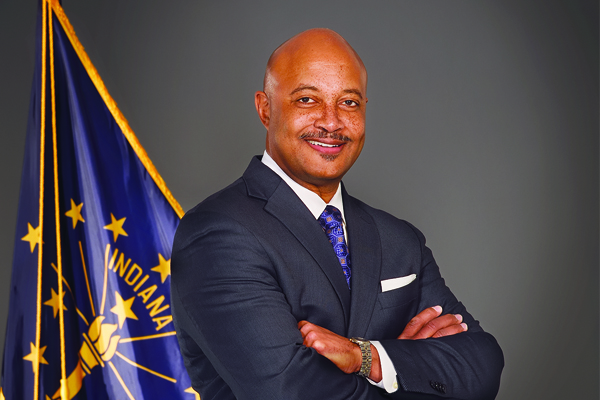Why the Curtis Hill Standard Suddenly Vanishes at the City-County Building
by Abdul-Hakim Shabazz
Back in 2018, Indiana Democrats—especially those from Indianapolis—showed zero hesitation when Attorney General Curtis Hill faced credible allegations of groping several women at a post-session party. Within days, State Rep. Ed DeLaney formally requested an investigation and said flatly, “I think he has no choice but to resign.” He was joined by Rep. Mara Candelaria Reardon, who publicly identified herself as one of the victims and urged Hoosiers to “demand Hill’s resignation.” Senate Democratic Leader Tim Lanane called Hill’s actions “totally reprehensible,” while Indiana Democratic Party Chair John Zody threw the party’s weight behind the push to remove Hill from office.
Former State Senator Karen Tallian, now chairwoman of the Indiana Democratic Party, also made her position clear—calling for Hill to step down and emphasizing that his behavior was incompatible with the responsibilities of public office. She backed formal investigations and accountability. But in 2025, as misconduct allegations swirl inside a Democratic administration in Indianapolis, Tallian has been notably silent. Not a public statement, not a tweet. Just crickets.
The message back then was clear: when public officials are accused of serious misconduct—especially by multiple women—you don’t wait for a court verdict or a polling memo. You lead. And leading meant saying Hill had to go.
Fast-forward to 2025. The names have changed, but the headlines are starting to look familiar.
This time, the controversy is centered inside Indianapolis City Hall, under Mayor Joe Hogsett’s administration. Former chief of staff Thomas Cook was the subject of multiple workplace misconduct complaints from female city employees—complaints that, by the city’s own admission, stretched back years. Cook eventually resigned, but only after growing public pressure and not before staying on the job for more than two months after the latest complaints were reported.
The city brought in an outside law firm, Fisher Phillips, to conduct an independent investigation. That report concluded the city met the basic legal standard for addressing the complaints but described a broader problem: a “culture of overly casual and professionally inappropriate behavior” across the administration. At least six other employees were also flagged for potential issues.
In response, three City-County Council members—Jesse Brown, Andy Nielsen, and Republican Josh Bain—have called for Mayor Hogsett to resign. Bain went a step further, describing the report’s findings as “damning” and questioning why the investigation didn’t involve subpoena power or more aggressive fact-finding. And yet, much of the broader Democratic political apparatus has remained silent—or at best, restrained.
Not everyone has stayed quiet. State Senator Andrea Hunley, also from Indianapolis, issued a strong public statement after a survivor who tried to speak at a council meeting was forcibly removed by law enforcement. “Indianapolis city leadership had one job: to honor survivors,” she said. “They failed to protect you.” Hunley called on local officials to take real action and commit to sustained accountability, not just damage control. There’s already quiet speculation that Hunley may be eyeing a mayoral run in 2027—and if she does, this moment may define her message.
So, what gives? In 2018, Democrats at the state level acted quickly and spoke loudly. Today, with a Democratic mayor in the spotlight, the response feels softer, slower, and a lot less certain.
Yes, the specifics of the two cases are different. But the pattern isn’t: women came forward with serious allegations; an investigation found corroborating issues; the accused denied wrongdoing; and leadership was asked to respond. In both situations, the credibility of our public institutions is at stake.
And that’s where consistency matters.
You don’t get to declare “zero tolerance” in 2018 and then look the other way in 2025. If Curtis Hill’s behavior and the resulting scandal made him unfit to serve—and many Democrats were right to say so—then the same principles should apply when the allegations hit closer to home. Leadership isn’t about convenience. It’s about accountability, even when it’s uncomfortable.
We set a standard in 2018. We said that protecting public trust meant drawing a line—and that line was crossed. The people of Indianapolis deserve the same commitment to integrity today, even if the political calculus feels messier.
Otherwise, we’re not enforcing a standard. We’re just practicing selective outrage. And in fairness, Denial-age is a hell of a drug.
Abdul-Hakim Shabazz is the editor and publisher of IndyPolitics.Org.











